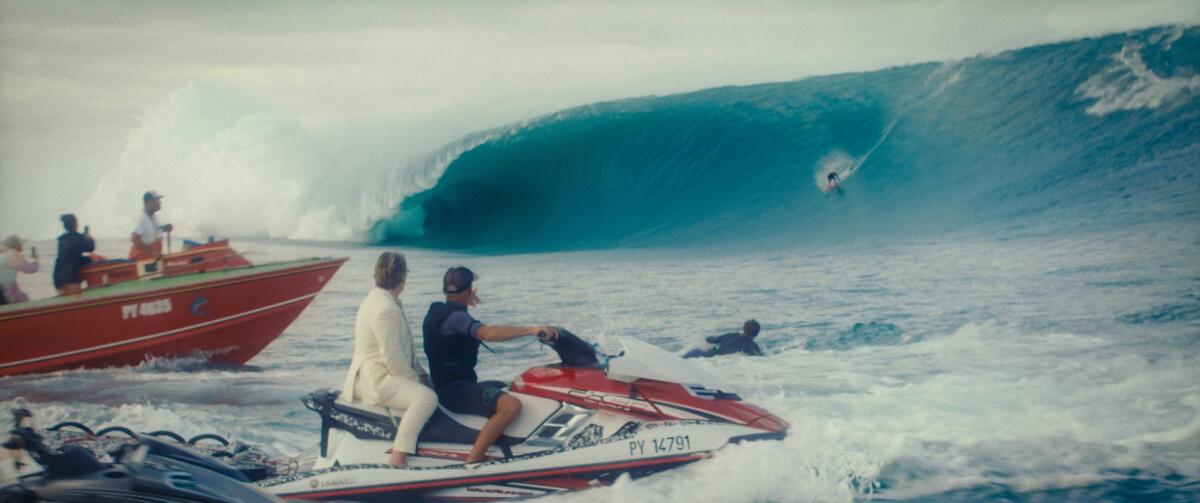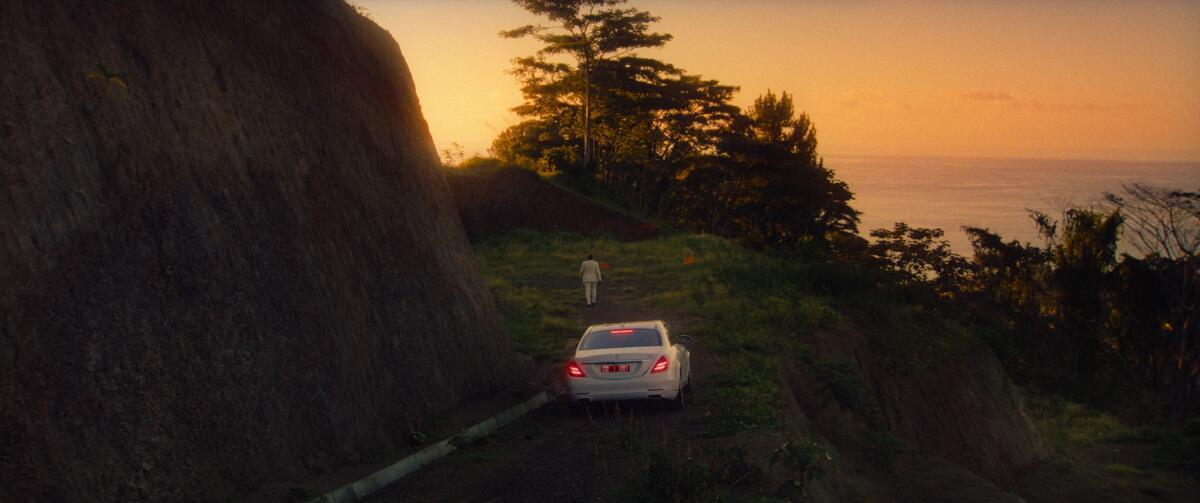Review: The gorgeous new movie ‘Pacifiction’ will hypnotize you. You should let it

- Share via
In the most gorgeous sequence in Albert Serra’s often-gorgeous “Pacifiction,” several small tourist yachts navigate the waters rolling gently beneath them off the coast of Tahiti. Over the sounds of waves cresting and crashing you can hear laughs and cries of delight, which might well become screams of terror if any of the boats were to capsize. But the captains do their jobs expertly, and everyone just keeps riding and bobbing along, chasing away but not entirely dispelling the notes of unease that roil this long, disquietingly hypnotic movie. Here in this Polynesian paradise, where sun-kissed tropical splendor gives way to neon-lit noir, the art of staying afloat is trickier than it looks.
One especially seasoned floater is a man known only as De Roller (Benoît Magimel), who serves as the French high commissioner of Tahiti. Wearing his authority as lightly and calmly as he does his white suit and tropical-print shirts, De Roller peers out through tinted sunglasses at a world that he has embraced as his own. He is a vestige of European colonialism, a representative of a state whose power in the region has waned but hardly vanished; he’s also a self-styled expat and a guide to the island and its various conflicting, overlapping agendas. His own intentions remain unclear in a story that luxuriates in a physical and metaphorical haze, and that prefers to hint at mysteries rather than solve them.
For your safety
The Times is committed to reviewing theatrical film releases during the COVID-19 pandemic. Because moviegoing carries risks during this time, we remind readers to follow health and safety guidelines as outlined by the CDC and local health officials.
By night, De Roller nurses umbrella-bedecked cocktails at a bar with locals and visitors (they’re not always easy to tell apart), attended to by servers in glow-in-the-dark thongs and bikinis. By day, he entertains guests, delivers speeches, solicits information and attends meetings, the most contentious of which involves an Indigenous activist (a stern Matahi Pambrun) who questions De Roller about a disturbing development on the luscious peachy-pink horizon. There are rumors that France plans to resume a campaign of nuclear testing around the island, a possibility signaled by the French marines we see arriving here early on, ferried by an admiral (Marc Susini) who is another of De Roller’s regular consorts.

In real life — a condition that the playfully titled “Pacifiction” evokes in its languid, plot-averse fashion — dozens of nuclear tests were performed in Polynesia between 1966 and 1996, exposing around 110,000 people to radiation and exacting a catastrophic human and environmental toll that France has never acknowledged. At times, we hear reference to that toll, as when a character describes the multiple cancers (breast, throat, thyroid) that a local woman endured in rapid succession. But those consequences remain unseen and largely undramatized, much like the quasi-intrigues and hushed rumors — of a passport stolen from a visiting Portuguese diplomat (Alexandre Melo), or of Tahitian women being smuggled aboard French nuclear submarines — that occasionally steal into the frame.
De Roller spends his days lazily investigating these affairs while overseeing Tahiti’s cultural and economic interests, positioning himself as a proud Frenchman, an adopted Tahitian or a hapless middleman as the occasion demands. You might be reminded of one of Graham Greene’s self-exiled antiheroes; I myself flashed back on Lucrecia Martel’s brilliant 2017 film, “Zama,” about an 18th century Spanish minister wasting away under the South American sun. In that movie, a sustained descent into a Conradian heart of darkness, the sense of moral and physical rot was pervasive, and the minister’s identity crisis ended in murder and madness. “Pacifiction’s” anticolonialist vision is more subdued but also, perhaps, more insidious; here, the rot remains largely hidden from view. (The most overt violence transpires between two roosters during a cockfight-themed traditional dance.) De Roller just keeps rolling along, either utterly oblivious to — or in casual mastery of — the chaos lapping at his shores.
“I just make sure everything’s OK,” De Roller says in a meeting with a potential investor. But things are far from OK, something that Serra trusts you’ll grasp even as he refuses to break the intoxicating spell of Tahiti itself. One of the most stunning widescreen panoramas in the movie (which was shot using digital cameras by Artur Tort) shows an open-air church back-framed by lush palms, mossy hills and a cloudy blue sky — an image so postcard-perfect you could almost overlook the sight of De Roller threatening the priest, demanding that he not oppose the opening of an upcoming casino. In scene after scene, Serra holds beauty and menace in a kind of uneasy equilibrium. He’s made a trouble-in-paradise movie where the trouble doesn’t overwhelm the paradise so much as poison it, at an almost imperceptible slow drip, from the inside.

That pleasurable aesthetic tension may explain why “Pacifiction,” despite its unhurried editing, narrative miasma and generous 2 1/2-hour-plus running time, emerges as one of Serra’s more seductive efforts. For this Catalan filmmaker, known by festivalgoers and art-house audiences for his inventive, sometimes impish engagements with literature and history (“Birdsong,” “The Death of Louis XIV”), the movie marks a rare foray into a world of contemporary paranoia. It also finds him undertaking a highly eccentric collaboration with Magimel, whose performance recently earned him a César Award. For much of the shoot, Magimel had to recite lines made up on the fly and fed to him by Serra through an earpiece — a fascinatingly intuitive choice for a character forced to maintain a polished, jovial presence in the face of multiple external pressures and unknowns.
That improvisatory approach informs all of “Pacifiction,” which, like much of Serra’s work, evinces a documentary-style resourcefulness and rigor. (It was shot under COVID-19 restrictions in August 2021, which surely accounts for its eerily underpopulated, faintly otherworldly feel.) Serra’s techniques, not for the first time, may frustrate your desire for narrative clarity and resolution, but they’re also the hallmarks of a filmmaker who’s thrillingly alive to the world he’s showing us. Never is this clearer than when his camera falls on the strikingly beautiful Shannah (Pahoa Mahagafanau), a transgender woman who’s never far from De Roller’s side, and whose suggestive, sphinx-like smile proves intimate, welcoming and conspiratorial by turns.
We see Shannah mingling and working a lot, sometimes as a hotel receptionist and sometimes a dance choreographer, but who is she in this movie’s intoxicatingly diffuse narrative scheme? A lover? A femme fatale? The spirit of the place? It isn’t clear, and it scarcely matters; she keeps you watching. She’s the most beguiling of this movie’s many mysteries, and perhaps a guardian of many others.
‘Pacifiction’
Not rated
In French, English, Polynesian and Portuguese with English subtitles
Running time: 2 hours, 42 minutes
Playing: Starts March 3 at Laemmle Royal, West Los Angeles; starts March 10 at Laemmle Glendale
More to Read
Only good movies
Get the Indie Focus newsletter, Mark Olsen's weekly guide to the world of cinema.
You may occasionally receive promotional content from the Los Angeles Times.











